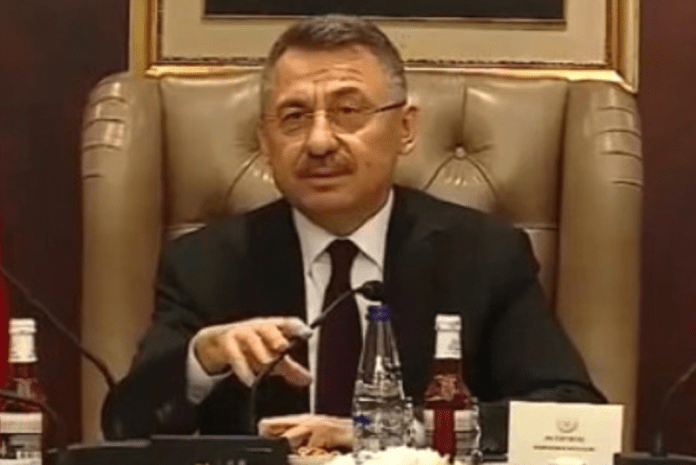Turkey’s State of Emergency Procedures Investigation Commission (OHAL Commission), which was established by the Turkish government led by President Recep Tayyip Erdoğan to investigate complaints filed by victims of state of emergency measures, has received 125,000 petitions but has reinstated only 2,700 petitioners to their jobs, according to Turkish Vice President Fuat Oktay.
The commission accepted only 40,000 out of the 125,000 applications submitted and has made decisions on these appeals, Oktay told Turkey’s state-run Anadolu news agency (AA). The applications of 37,300 people have been rejected, AA quoted Oktay as saying.
Since the declaration of the now-ended state of emergency, over 150,000 people in the police, military, academia, media and civil service were taken into custody, 78,000 were arrested and over 110,000 civil servants were dismissed from their jobs, while 40,000 were reinstated, 3,600 by decree, according to authorities. Nearly 5,000 institutions were shut down over alleged links to the Gülen movement.
The legal path for those dismissed by decree had been closed under the state of emergency, but a route to appeal was opened when the commission was formed on Jan. 23. The commission only started to make decisions in December 2017.
The commission was formed after warnings by the European Court of Human Rights (ECtHR) about a case overload. The 24,000 applications rejected by the ECtHR, which cited the existence of the emergency panel, were sent to the commission.
In an attempt to dampen outcry from domestic and international organizations over rights violations and arbitrariness, the OHAL Commission began accepting applications on July 17, 2017, from former public employees suspended from their jobs. The application period ended on September 14, 2017. However, the commission led by the openly Erdoğanist deputy undersecretary of the Justice Ministry, Selahaddin Menteş, has been widely criticized for bias.
It was previously reported in the pro-government media that officials from the commission said that as of Jan. 10, 2018, over 104,398 people had applied to the commission, while 108,736 were dismissed from their jobs. According to the reports, the investigative process has been carried out under a barcode system.
The commission has seven members, three of whom were appointed by the prime minister, one by the Justice Ministry, one by the Interior Ministry and two by the Board of Judges and Prosecutors (HSK). A total of 190 personnel, 28 judges, 30 inspectors, and 40 experts are working for the commission.
The commission can demand any information and documents from public institutions and judicial authorities except for documents subject to confidentiality as part of ongoing investigations or otherwise classified state secrets. Public institutions and judicial authorities are obliged to immediately provide the requested information to the commission and facilitate any inquiries.
Critics say the OHAL Commission is solely aimed at reducing the number of applications to the ECtHR. However, 22,000 teachers from private schools whose licenses have been canceled by statutory decree are not eligible to apply to the commission. Likewise, judges and prosecutors have not been suspended by the lists attached to the government decrees but were dismissed in decisions taken by the relevant authorities responsible for the institutions in which they served.
The ECtHR’s requirement of the “exhaustion of domestic remedies” in order to accept applications forced the Turkish government to form the OHAL Commission as a kind of formality. With the establishment of the OHAL Commission, ECtHR decisions for compensation and such have been prevented. According to complaints, the government structured the commission to work as slowly as possible, in the process blunting the reactions of victims.
Moreover, under a regulation governing the return of dismissed personnel, vested rights have not been reinstated. The government’s placement of victims in institutions can be considered exile rather than reinstatement to their jobs. It is very likely that the OHAL Commission will make a positive decision about mistakenly dismissed government supporters and that only they will be returned to their jobs.
In the aftermath of the controversial coup attempt on July 15, 2016, 26 decree laws (KHK) were issued under the state of emergency declared on July 20, 2016. So far 114, 961 public servants have been dismissed from their jobs under these KHKs, while 32,180 officials were “struck off.”
To date, 47 private health institutions, 881 private educational institutions, 108 private student dormitories, 104 foundations, 1,409 associations, 19 trade unions, 15 private universities, five news agencies, 17 TV channels, 22 radio stations, 46 newspapers, 20 journal and 29 publishing houses/distribution companies have been closed down.
Hundreds of thousands of people in Turkey have been the subject of legal proceedings in the last two years on charges of membership in the Gülen movement since a coup attempt on July 15, 2016, a Turkish Justice Ministry official told a symposium on July 19, 2018.
“Legal proceedings have been carried out against 445,000 members of this organization,” Turkey’s pro-government Islamist news agency İLKHA quoted Turkish Justice Ministry Deputy Undersecretary Ömer Faruk Aydıner as saying.
Turkey survived a controversial military coup attempt on July 15, 2016, that killed 249 people. Immediately after the putsch, the Justice and Development Party (AKP) government along with President Recep Tayyip Erdoğan pinned the blame on the Gülen movement.
Fethullah Gülen, who inspired the movement, strongly denied having any role in the failed coup and called for an international investigation into it, but President Erdoğan — calling the coup attempt “a gift from God” — and the government initiated a widespread purge aimed at cleansing sympathizers of the movement from within state institutions, dehumanizing its popular figures and putting them in custody.
Turkey has suspended or dismissed about 170,000 judges, teachers, police and civil servants since July 15, 2016. On December 13, 2017, the Justice Ministry announced that 169,013 people have been the subject of legal proceedings on coup charges since the failed coup.
Turkish Interior Minister Süleyman Soylu announced on April 18, 2018, that the Turkish government had jailed 77,081 people between July 15, 2016, and April 11, 2018, over alleged links to the Gülen movement.



